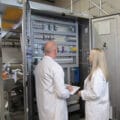An increased focus on equality, diversity and inclusion can support the recruitment challenges faced by many businesses in the engineering sector today. But there are other clear ways that developing a diverse workforce can benefit a business. David Bernie, Branch Manager at Mid Kent Electrical and member of the Association of Electrical and Mechanical Trades’ newly formed Equality, Diversity and Inclusion Committee, reflects on the missed opportunity to draw on a friend’s unique skillset.
In a job interview, you say you are there to grow, to learn more about your subject. You do not speak the whole truth; that you are prepared to settle for the amount of money you are offered for the opportunity to work hard. Some of us know what we want to do early in our school years. Others will retire wondering what happened. Survival is the primary reason. If you love your work, that is a bonus. Maybe this is the same for love? Does this person mean everything, or do we need someone to help us with the mortgage? How about exercise? Do you really love running, or do you want to gorge yourself after a marathon guilt-free?
Diversity? Now that is a tricky one. We want to be accepted above all else. Let me tell you a story about a friend who did not get the acceptance he needed. This is a lesson about diversity and its vital role in life.
I saw it coming, and I could do nothing. When you spot the ending in a film, you get a glimpse. You cannot quite verbalise it yet, but you feel something. I knew I had not heard from him in a while, but I had not realised how long. I will not say something banal like I knew what was on that text, but whenever I receive an oddly timed communication, I think the worst. This time I was right. I remember when I met him at school, his appearance was striking; I had not seen anybody like him before.
He acted differently, too, caring, thoughtful, almost too much, especially for someone in his early teens. His father arrived in this country with nothing and in one generation had built a successful business that was set up for the healing and caring of others. After numerous interview rejections, my friend was forced to join the family company and was now instrumental in its operation. Our group of friends had a broad skill set in finance, law, humanities, and business. It was his dream that we would rally together for a greater cause, funded by his family profits. This never materialised.
Whilst his plan was far from complete, there was a glimmer of potential. A green shoot we should have nurtured and not eradicated from the pavement cracks. If only we had been more patient, more invested, asked more questions. I lament the negativity we responded to him with. His despair grew. Being unable to channel his resources into something greater meant he resorted to random acts of kindness. He passed out dressing gowns from an upmarket department store to the homeless. He reduced the rent on one of the properties he owned by 90% based on nothing but a sob story. He cleared out the gift shop at the Houses of Parliament to give to schoolchildren.
I missed him one morning, so I drove over to his house. The door opened and I felt the air. A cold draft hit the back of my throat. I had never felt so thirsty. I realised my foot was over the threshold. He would have to slam the door to move it.
Why are you here? Because I’m worried about you.
I’m fine. I don’t believe you; for a man with so many phones, you don’t do much texting.
What do you want? To see you.
I’m fine.
I stepped back just in time as he slammed the door in my face. Stunned, I paused and looked around. Months-old weeds had invaded the driveway. Mature dandelions fountained out of the swaying lawn. A rusted washing line leaned against the splintered fence. I wandered to the front of the house. A heavy net curtain dominated the bay window. I could tell the lights were off.
My greatest regret is that I did not push my way into the house when I had the chance.

Beautiful vector image with nice watercolor brain
Isolation and distance followed. We were not allowed in his house. When we finally did gain access, we had to wade through knee-high piles of fast-food wrappers. The sink was black. Dotted around the room were spoils of his business success. High-value electronics, aged liquor, and the latest fad item, peppered among the chaos. It was not until afterwards that we discovered the scale of his outgoings. His attempts to right the world in his own way. Clearing out bookshops to gift to schools or dozens of sim cards to hand to strangers who needed them. Close to the end, he showed me one of his most prized possessions, a second edition of the Origin of Species, thousands of pounds worth of book. Ironically, Charles Darwin did not have many believers until he was gone either.
The business world needed this individual. He modernised and streamlined an already successful business. He found efficiencies where they looked as though they did not exist. His sharpened focus allowed him to achieve his business deliverables at a breathtaking rate. Yet instead, he was ignored, allowed to retreat into himself, his potential and talents wasted. Yes, he ran his business alone, but he would have thrived in an organisational environment. He would have complemented any team, and instead, he worked in isolation – to the detriment of those in the business world who would have benefited from his neurodiversity. There are many others like my friend that employers reject before they even start.
I often reflect on what could have been. He used his intellect to encourage and include others, not outmanoeuvre them. His warmth was real and not a bright façade to lure a mark to their undoing like a corporate moth. His fascination with technology and invention drove his business forward; the wheel of change did not get stuck in the mud. His subordinates were made to feel like a part of a whole rather than a necessary expense. The final thing he did was run their payroll before he closed his laptop for the last time.
If we do not look for people with varied experiences, we cut ourselves off from valuable resources and valuable insights. Had the world accepted my friend’s neurodiversity, he would have been a great organisational asset. My friend cut himself off from us and we are weaker for it. His diverse mind was not valued and supported. People with atypical intellectual approaches would now be described as ‘neuro-diverse’, and as the award-winning investigative reporter and author Steve Silberman states in his book NeuroTribes, which documents the origins and history of autism from a neurodiversity viewpoint, “Businesses are moving on from the notion of employing people with cognitive disability as a form of charity to realising that it can be good business”. He goes on to observe the following: “They’re realising that they can think in ways neuro-typical people can’t, can identify problems invisible to neuro-typical employees and suggest solutions outside of the box.”
During WWII, Percy Spencer was working on an energy source for radar equipment. He was unsuccessful in that pursuit, but he did manage to melt the chocolate bar in his pocket. Thus, he ushered in the era of the microwave. Whilst this may be a light-hearted allegory for the romantic side of invention and discovery, it originates from a different time in our history. The demands on the engineering world will continue to increase, companies want results, and we need to rise to this challenge by casting further out into the talent pool and embracing those who think differently.
My friend was not appreciated when he was around. Maybe we were too quick to judge. Maybe he needed to leave us to make us understand. Years passed. His peer group, my friends, are closer than ever; even our children are close. Every year we hold a charity event in celebration of our time together and donate to those who still experience the anguish my friend once harboured. His influence still reaches into the future he never experienced to motivate and encourage others.
I did not know about neurodiversity. My friends did not know about neurodiversity. Most organisations did not know about neurodiversity. Contrary to conventional thought, those who think and act differently do not have water in the fuel tank; rather they are a precious metal. Rare and hard to extract, but once mined, they are critical to any operation. Do we want to diversify our organisations because we think we should or because it is a convincing value proposition and a savvy business decision?
You decide.
Further details on the work being undertaken by the AEMT’s Equality, Diversity and Inclusion Committee, can be found on the website – www.theaemt.com.








